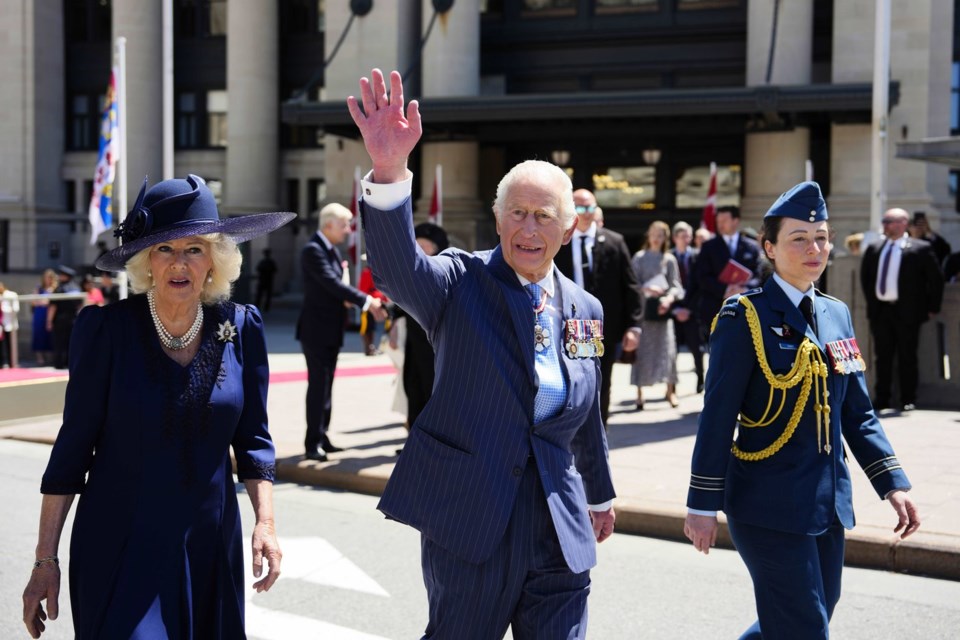OTTAWA — Prime Minister Mark Carney meant to send a message to U.S. President Donald Trump by inviting King Charles to Ottawa this week, foreign policy experts say — but Trump may not have been the only target audience.
Multiple experts in foreign policy say they're convinced Carney arranged the whirlwind royal visit to reaffirm Canada's sovereignty and distinct political culture before a global audience in response to Trump's ruinous trade policy and repeated calls for Canada's annexation.
Roy Norton, a fellow at the Balsillie School of International Affairs, said he also doubts Carney would have invited the King had British Prime Minister Keir Starmer not made the controversial decision to invite the president for a second state visit to the United Kingdom.
That invitation was formally issued by King Charles but would have been offered on Starmer's advice.
"I think Trump isn't the only audience internationally, but I think Trump's an important one," Norton said. "Starmer is also on notice as he's been reminded that the King has these responsibilities beyond simply serving the interests of the United Kingdom."
Carney told Britain's SkyNews in an interview earlier this month that Canadians "weren't impressed" by London's invitation to Trump, "given the circumstance."
Norton said the visit also may have been intended to remind the King of his own responsibilities to Canada.
While many Canadians were disappointed that the King made no direct statement pushing back on Trump's annexation talk, the throne speech he read in Ottawa emphasized Canada's sovereignty and his close personal relationship with the country.
While Trump was relatively quiet about the royal visit itself — which saw the King welcomed by cheering crowds in Ottawa — he called again Tuesday for Canada to become part of the United States.
In a post on social media, Trump said Canada would pay billions of dollars to take part in his unbuilt Golden Dome missile defence system if "they remain a separate, but unequal, Nation, but will cost ZERO DOLLARS if they become our cherished 51st State."
Fen Hampson, a Carleton University professor and an expert on Canada-U.S. relations, said that while he thinks the royal visit was "all about Trump," the president remains "immune to messaging or persuasion of any kind."
"In extraordinary times, you have to pull out all the stops and call on friends to send a strong message that Canada is not for sale, now, tomorrow or ever," he said.
Hampson said he doesn't think the visit itself did much to unify Canadians beyond the effect Trump is having already.
"It's the threat of Trump that's unifying Canadians, not the King," he said.
This was only the third time a sitting monarch had read the speech from the throne in Canada. Queen Elizabeth II did so in 1957 and 1977.
A Liberal government official, speaking on background, told The Canadian Press that the goal of the royal visit was to help Canadians reconnect with their cultural and political roots at a time when the country's sovereignty is being threatened.
Daniel Béland, director of the McGill Institute for the Study of Canada, said the visit served as "a way to draw attention to the distinctiveness of our political institutions."
"It's also about PR and about raising the profile of Canada and, in a way, of the government's policies," he said, noting that the visit received international attention. "It's certainly sending a message about the fact that Canada is in a way not isolated, that it has its own identity."
Asked by reporters Tuesday if he thinks the throne speech will help the federal government in its negotiations with the Trump administration, Conservative Leader Pierre Poilievre said it's hard to tell what moves the president.
"I think it's important that the world recognize that we have those ancient traditions and the Americans recognize that we are an independent and free country that will make its own decisions," Poilievre said.
— With files from Craig Lord
This report by The Canadian Press was first published May 28, 2025.
Catherine Morrison, The Canadian Press



